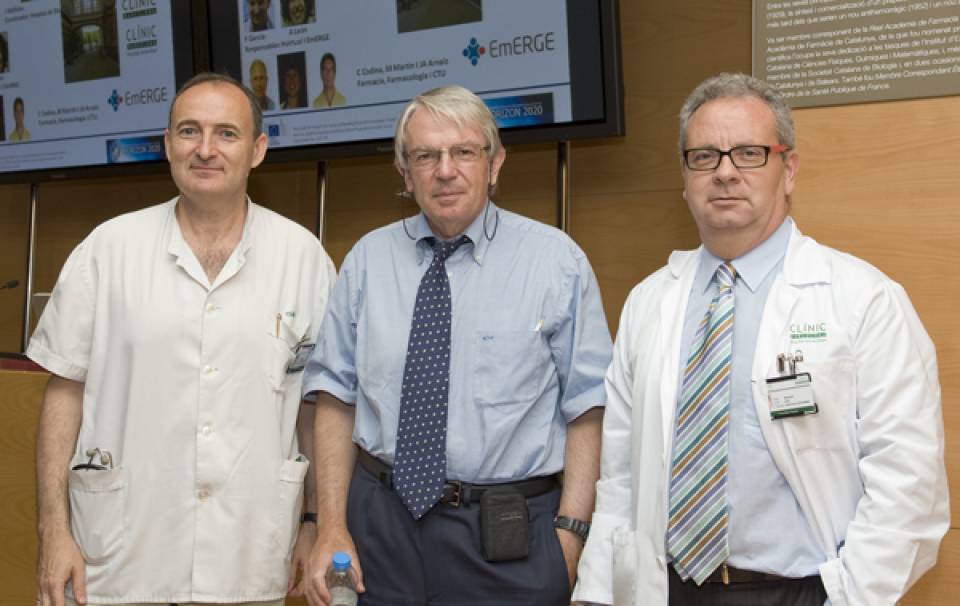People with HIV are stable patients with a normal quality of life, both socially and in the workplace. They must follow strict controls that require many visits to the hospital, representing a high investment in time and money. The existing telemedicine platforms like Hospital VIHrtual, working in Hospital Clinic for 10 years, complement and improve the classical system: it allows the patient to go to the hospital only for the blood extractions and some of the control visits and optimizes the communication between the patient and the center. Currently, in the case of the Clinic telemedicine project, more than 400 patients benefit from these advantages.
From anywhere
On this basis, and in collaboration with other four European hospitals (Brighton and Sussex Hospitals NHS Trust (UK), the Institute of Tropical Medicine in Antwerp (Belgium), the Hospital Center at Central Lisbon (Portugal) and the University Hospital "Dr. Frank Mihaljevic "(Croatia)) the aim of this project is to make the jump to mobile devices (phones and tablets) to bring these technologies closer to the society, as they will allow consultations from anywhere with the only requirement of having an internet connection.
The design of the application will consider the possibility of putting alarms to take medication, scheduling visits and the access of patients to their medical records. This will reduce the burden of care but, above all, improve the communication between doctor and patient.
This ‘app’ is expected to be finished in about one year and patients and doctors may start to try it at the end of 2016. Then the validation study will begin with about 4,000 patients, coordinated by Dr. Felipe Garcia of the Hospital Clinic. The investigators involved in this project from the Clínic are Dr. Josep M. Gatell, Head of the Infectious Diseases Department; Dr. Agathe Leon, Principal Investigator of the EmERGE project in Barcelona; Dr. Josep Mallolas, principal investigator of the study with the application at Hospital Clinic; Dr. Maite Martín, responsible of the project at the Pharmacy Department in Hospital Clínic; and Dr. Joan Albert Arnaiz, Head of the Clinical Trials Unit at the Clínic and who will monitor the validation study at an European level.
Medication control: contraindications and adherence
An important aspect that this application seeks to improve is the adherence to treatment. In the case of HIV patients, taking the medication correctly is crucial, or else drug resistances can appear. The more resistances appear, the more complicated the treatment is and more expensive and toxic are the medications.
On the other hand, most HIV patients (80-90%) are well controlled and 95% have an undetectable viral load, but the average age is about 50 years, implying that they may have other health problems requiring any other medication. Antiretroviral therapy usually has many interactions with other drugs, which can be fatal, so it is very important to ensure that there are no contraindications between treatments. This application will solve any doubts that patients may have without having to visit a doctor to solve them.
The full list of participating institutions in the EmERGE project is:
- University of Sussex (UK)
- European AIDS Treatment Group EV
- University of Brighton (UK)
- Prins Leopold Instituut voor Tropische Geneeskunde (ITM)
- Podmedics (UK)
- Fundació Clínic per a la Recerca Biomèdica
- Brighton y Sussex University Hospitals NHS Trust (UK)
- Centro Hospitalar de Lisboa Central
- University Hospital "Dr. Fran Mihaljevic"
- The National Prospective Monitoring System (NPMS-HHC-CIC)
- Universidad Politécnica de Madrid (UPM)
- MHealth Futures LTD (UK)
The EmERGE Project has received funding from the European Union’s Horizon 2020 Researcher and Innovation Programme under Grant Agreement No. 643736

